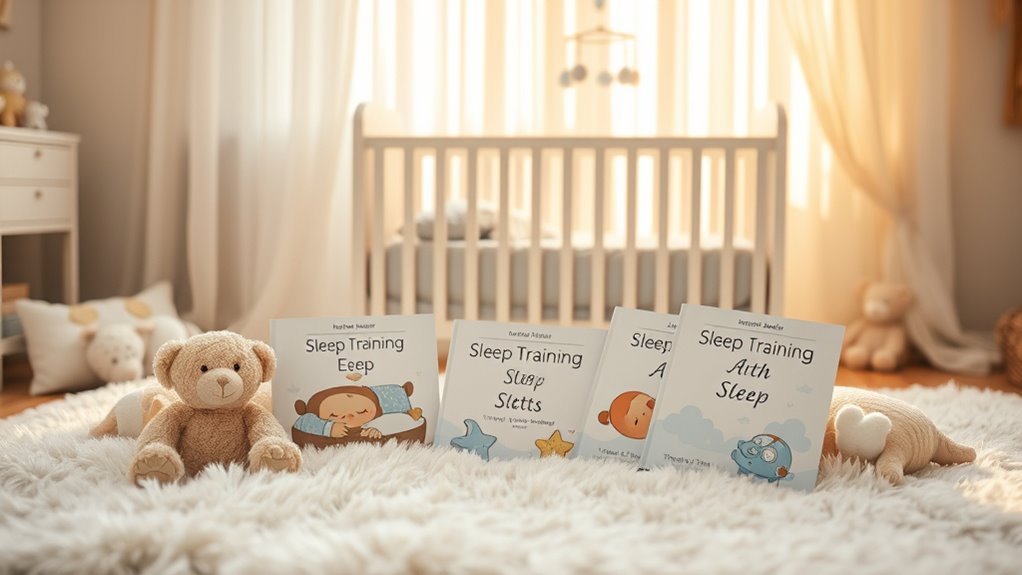If you’re searching for the best sleep training books to help your family enjoy restful nights, I’ve gathered some expert recommendations. Titles like “Twelve Hours Sleep by Twelve Weeks Old” and “Precious Little Sleep” provide structured plans and practical solutions for parents. You’ll find guidance in “Healthy Sleep Habits, Happy Child” and “Become Your Child’s Sleep Coach” to foster good sleep routines. Stick around, and you’ll discover even more insights into choosing the right book for your needs.
Key Takeaways
- “Twelve Hours Sleep by Twelve Weeks Old” offers a structured plan for infants to sleep through the night by 12 weeks, ensuring restful nights for parents.
- “Precious Little Sleep” provides practical solutions for sleep challenges in infants and young children, fostering a supportive community among parents.
- “Babywise Sleep Solutions” emphasizes Parent-Directed Feeding to establish healthy sleep patterns early on, empowering parents with a clear framework.
- “Solve Your Child’s Sleep Problems” utilizes Dr. Ferber’s method for effective sleep training and self-soothing, addressing sleep issues for children of all ages.
- “Healthy Sleep Habits, Happy Child” presents flexible strategies endorsed by pediatricians, tailored to individual child needs for establishing healthy sleep routines.
Twelve Hours Sleep by Twelve Weeks Old: A Step-by-Step Plan for Baby Sleep Success
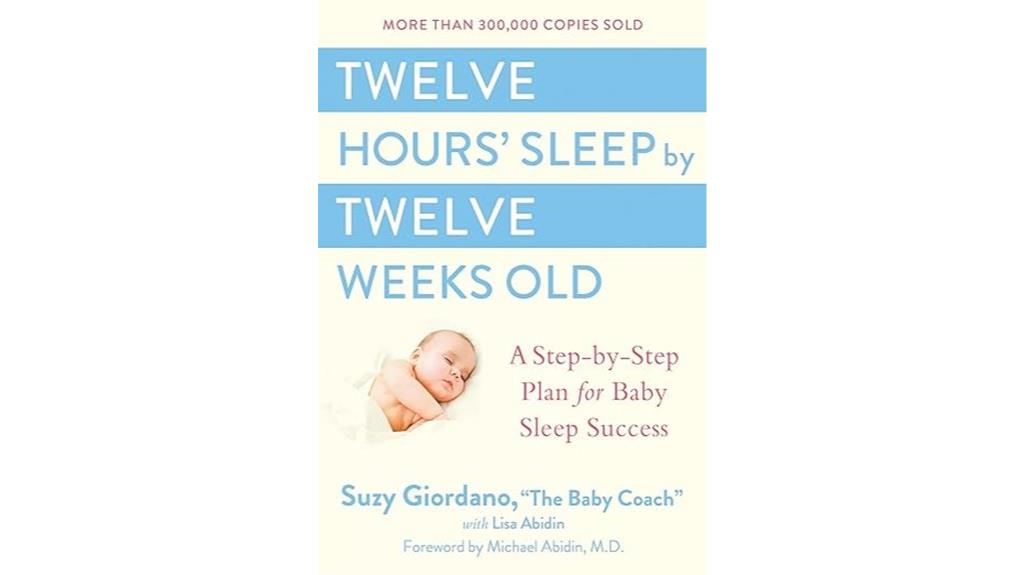
If you’re a parent looking to establish a solid sleep routine for your baby, “Twelve Hours Sleep by Twelve Weeks Old” might be just the guide you need. This book provides a structured plan that many parents, including myself, have found effective. I’ve heard stories of babies sleeping through the night as early as nine weeks! While some critics voice concerns about its methods, I believe the adaptability of the routine is key. You can tweak it to fit your family’s needs. Overall, I’ve seen firsthand how this approach can lead to happier, well-rested households.
Best For: Parents seeking a structured sleep routine to help their babies sleep through the night by 12 weeks old.
Pros:
- Provides a clear, step-by-step plan that many parents find effective.
- Allows for adaptability, enabling parents to customize the routine to fit their family’s unique needs.
- Positive success stories from numerous parents highlight improved sleep patterns and overall happiness for both babies and families.
Cons:
- Some criticism arises from differing parenting philosophies, such as co-sleeping or constant breastfeeding.
- Critics may misunderstand the methods, leading to concerns about potential malnourishment or negative impacts on the baby’s well-being.
- Requires commitment and consistency, which may be challenging for some families to maintain.
Precious Little Sleep: The Complete Baby Sleep Guide for Modern Parents
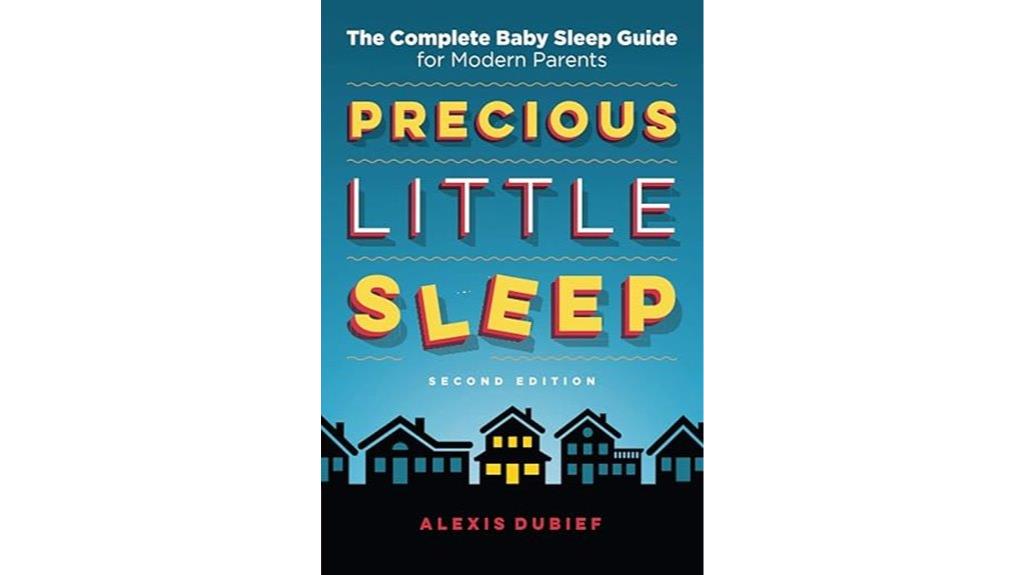
“Precious Little Sleep: The Complete Baby Sleep Guide for Modern Parents” is an ideal choice for overwhelmed parents seeking practical, effective sleep solutions for their infants. This thorough guide covers everything from self-soothing to tackling common sleep issues for kids up to age five. I loved the approachable, humorous writing style, which made the information relatable during those exhausting nights. Many parents, like me, have seen amazing results, with babies learning to sleep independently in just weeks. Plus, the supportive community around the book offers a space to share experiences and advice, making the journey feel a little less lonely.
Best For: Overwhelmed parents looking for practical and effective sleep solutions for their infants and young children.
Pros:
- Provides a comprehensive guide covering sleep from birth to age five, addressing various sleep issues.
- Emphasizes gentle sleep training methods, offering alternatives to traditional cry-it-out approaches.
- Includes access to a supportive community for parents to share experiences and seek advice.
Cons:
- Some readers desire better navigation tools for quickly accessing specific topics within the book.
- A few parents may find the humor not suited to their preferences during stressful nights.
- The book may not cover every individual sleep challenge, requiring additional resources for some families.
Babywise Sleep Solutions: Begin as You Mean to Go with (To the Point)
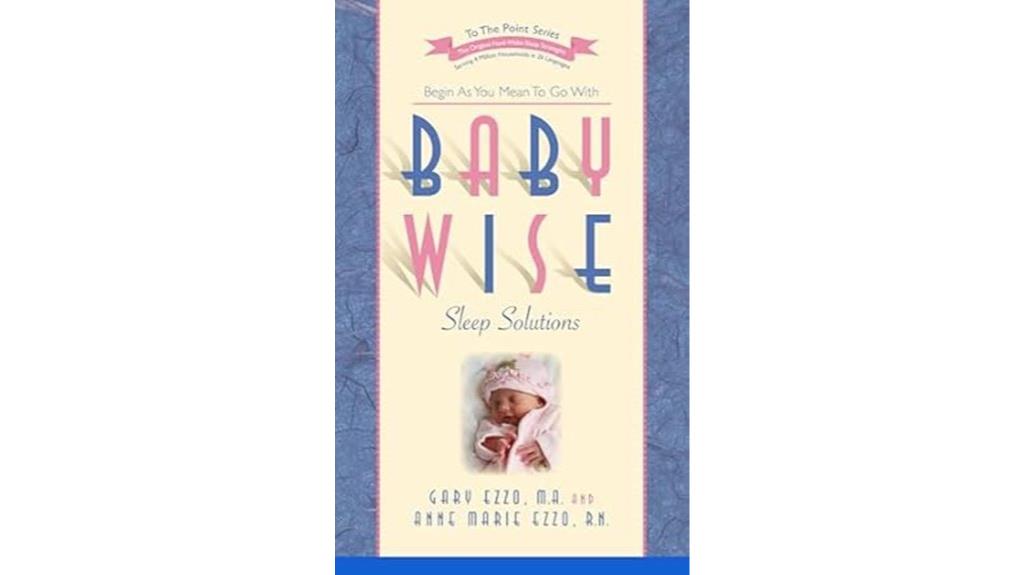
For parents seeking a structured approach to sleep training, “Babywise Sleep Solutions” stands out as a practical guide that empowers you to establish healthy sleep patterns for your baby. It emphasizes Parent-Directed Feeding, giving you control over feeding and sleep routines. Many parents share success stories of their little ones sleeping through the night as early as 6 to 8 weeks. This book is filled with humor and common-sense insights, making it relatable amidst the chaos of parenting. While it suggests letting babies cry it out, it’s essential to find what works best for your unique family dynamics.
Best For: Parents looking for a structured sleep training method to help their babies establish healthy sleep patterns early on.
Pros:
- Provides a clear framework with Parent-Directed Feeding to help parents manage feeding and sleep routines effectively.
- Many parents report significant success with their babies sleeping through the night as early as 6 to 8 weeks.
- The book’s humor and practical insights make it relatable and enjoyable to read during the often chaotic early parenting phase.
Cons:
- Some parents may find the suggestion of allowing babies to cry it out concerning or not in line with their parenting instincts.
- Critics warn that certain methods may not suit every family’s unique dynamics or could lead to emotional impacts on the child.
- The approach may not work for all babies, necessitating a tailored strategy for individual family needs.
Solve Your Childs Sleep Problems: New, Revised, and Expanded Edition
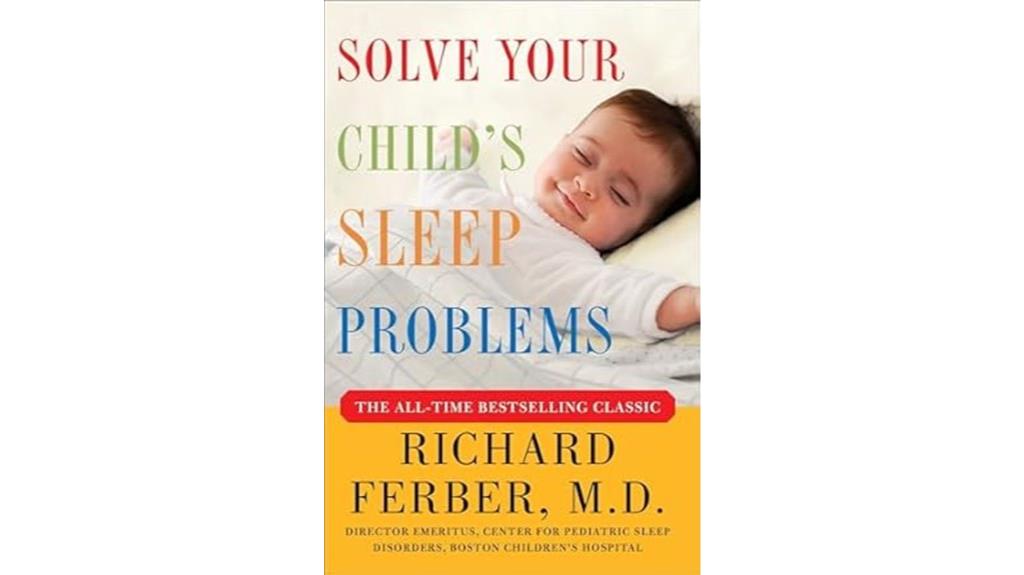
Parents seeking effective strategies to address their child’s sleep problems will find “Solve Your Child’s Sleep Problems: New, Revised, and Expanded Edition” to be an invaluable resource. This book offers clear guidance on sleep training, particularly through Dr. Ferber’s method, which emphasizes self-soothing and addressing sleep associations. While the initial nights might be tough, many parents, including myself, have seen significant improvements within days. Ferber’s compassionate approach reassures us that short-term discomfort can lead to lasting benefits. Plus, the book covers older children’s sleep challenges, making it a thorough tool for fostering healthier sleep habits in our families.
Best For: Parents looking for effective sleep training methods to help their children develop healthy sleep habits.
Pros:
- Clear guidance: Offers detailed strategies based on Dr. Ferber’s method, making it easy for parents to follow.
- Short-term improvements: Many parents report significant progress within a few nights, leading to better sleep for both children and parents.
- Comprehensive resource: Addresses sleep challenges for both infants and older children, providing valuable insights for families.
Cons:
- Initial emotional struggle: Parents may find it difficult to hear their child cry during the initial training phase.
- Varied results: While many see improvements, outcomes can differ based on individual child behavior and family dynamics.
- Potential overwhelm: The variety of methods and approaches discussed may be overwhelming for some parents trying to decide on the best strategy.
Healthy Sleep Habits, Happy Child, 5th Edition: A Step-by-Step Guide for Good Sleep
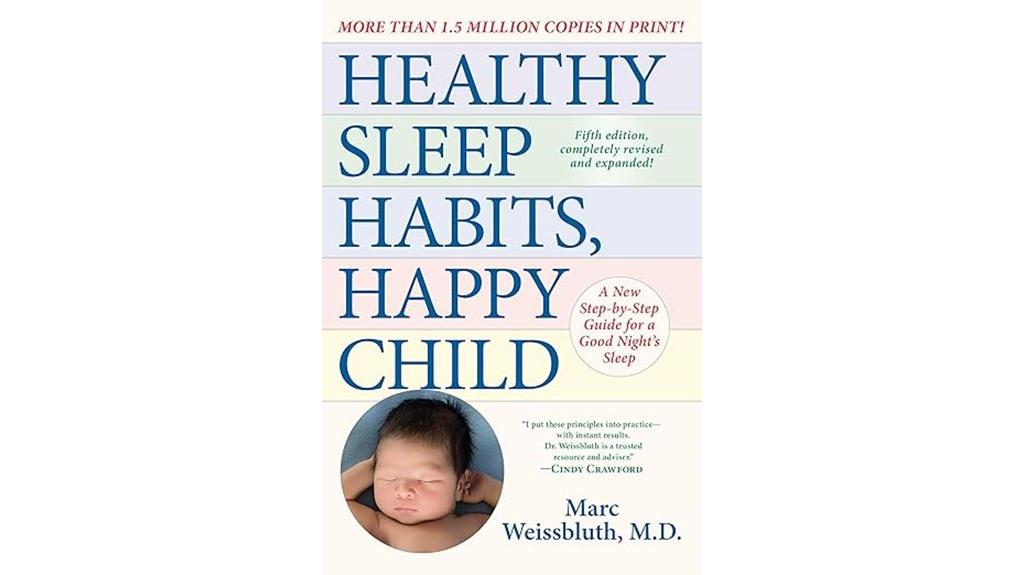
If you’re looking for an extensive guide to establishing healthy sleep routines for your child, “Healthy Sleep Habits, Happy Child, 5th Edition” by Dr. Marc Weissbluth is a fantastic resource. This book emphasizes understanding your child’s unique needs and provides flexible strategies rather than rigid rules. I found Dr. Weissbluth’s advice on recognizing drowsiness and promoting self-soothing skills particularly helpful. Many parents have praised the practical tips, making it ideal for first-timers. While some readers note the organization could be improved, the long-term benefits of implementing these strategies are undeniable. This book is definitely worth considering for restful nights ahead.
Best For: Parents seeking a comprehensive guide to establish healthy sleep routines tailored to their child’s unique needs.
Pros:
- Provides flexible strategies rather than rigid rules, accommodating individual child needs.
- Offers practical tips that are especially beneficial for first-time parents.
- Endorsed by pediatricians and many readers for its long-term positive impact on children’s sleep patterns.
Cons:
- Some readers find the organization and length of the book cumbersome and overwhelming.
- The writing style may feel demeaning to sensitive readers.
- Improved editorial clarity could enhance overall readability and navigation.
Its Never Too Late to Sleep Train: The Low-Stress Way to High-Quality Sleep for Babies, Kids, and Parents
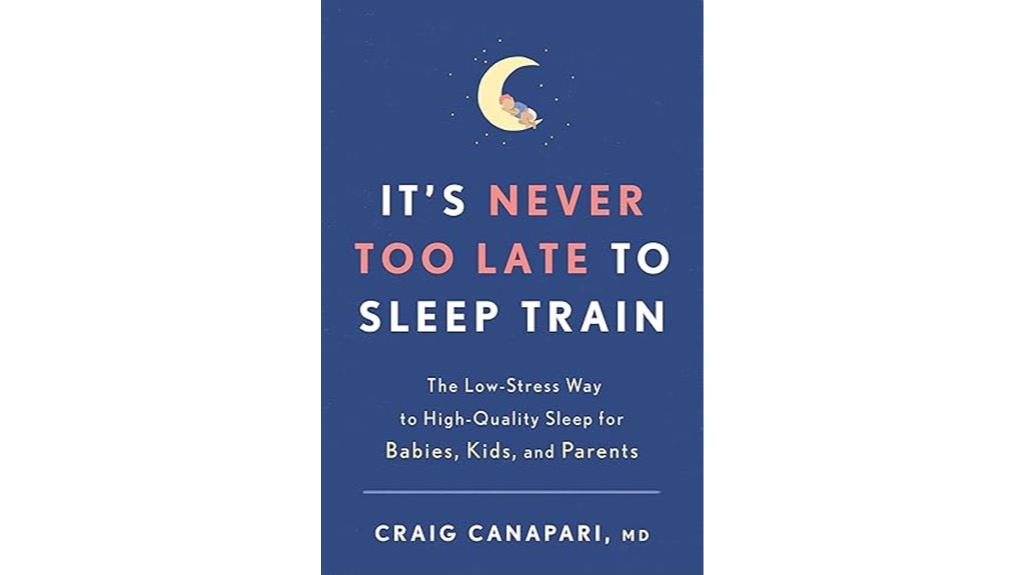
Recognizing that sleep struggles can affect families with children of all ages, “It’s Never Too Late to Sleep Train” stands out as an invaluable resource for those seeking effective, low-stress solutions. Dr. Canapari, a pediatrician and father of four, combines professional expertise and personal experience to offer relatable advice. The book provides clear, actionable strategies for various sleep issues, including those faced by children with developmental disorders. Its flexible approach allows parents to choose methods that fit their family dynamics. Readers rave about its optimistic tone, making it a much-needed guide for anyone looking to improve their child’s sleep habits.
Best For: Parents seeking effective and flexible sleep training solutions for children of all ages, including those with developmental disorders.
Pros:
- Offers a variety of evidence-based and experience-based sleep strategies tailored to different family dynamics.
- Features a non-judgmental and optimistic tone, making it relatable and encouraging for sleep-deprived parents.
- Summarizes key takeaways at the end of each chapter for easy reference and implementation of techniques.
Cons:
- Some parents may find the variety of options overwhelming when trying to choose the best strategy for their child.
- The book may not provide a one-size-fits-all solution, potentially requiring additional research for specific issues.
- As with any sleep training method, results may vary, and not all techniques may be effective for every child.
The Sleepeasy Solution: The Exhausted Parents Guide to Getting Your Child to Sleep
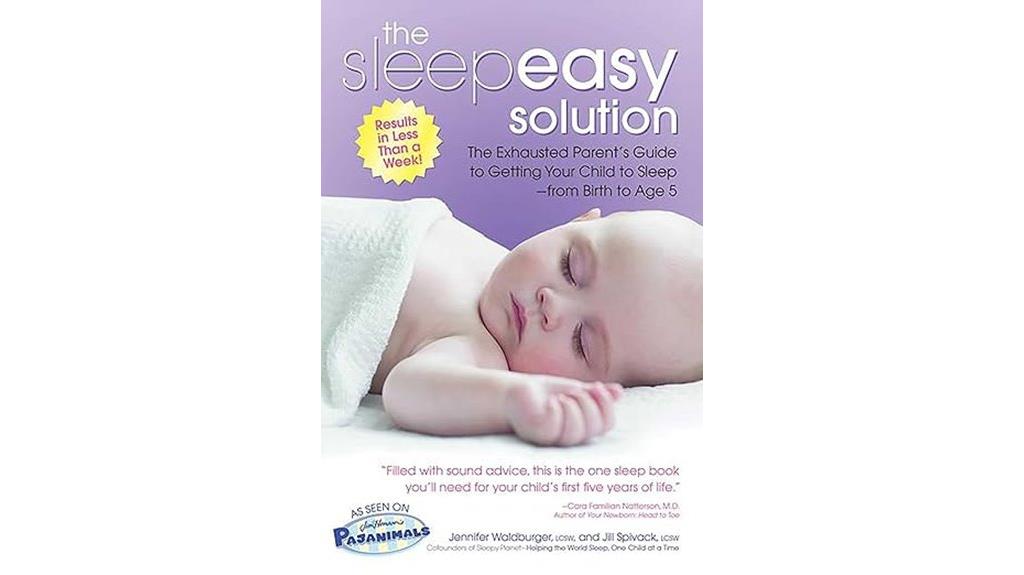
For those feeling overwhelmed by sleepless nights and the challenges of getting their little ones to sleep, “The Sleepeasy Solution” offers a practical, step-by-step guide tailored for children from birth to age 5. I found this book incredibly helpful in establishing healthy sleep habits for my baby. It emphasizes addressing sleep issues early, ideally before 4 months. Many parents, including myself, have seen remarkable results—my little one now sleeps through the night and can self-soothe. While the initial crying can be tough, the long-term benefits of better sleep for both baby and parent make it worth it.
Best For: Parents of children aged birth to 5 years seeking effective methods to establish healthy sleep habits and improve their child’s sleep quality.
Pros:
- Comprehensive guidance: Offers a step-by-step plan tailored to various age ranges and sleep issues.
- Positive results: Many parents report significant improvements in sleep patterns, with children sleeping through the night and self-soothing.
- Flexible approach: The methods can be adjusted based on individual circumstances, making it adaptable to different family situations.
Cons:
- Initial crying involved: Some parents may find the crying during the training process challenging and distressing.
- Mixed opinions: There are dissenting views on the approach, with some labeling it as potentially dangerous.
- Adjustment period: Parents should prepare for initial resistance, which may require patience and persistence before seeing results.
Potty Training in 3 Days: Step-by-Step Plan for Clean Break from Diapers
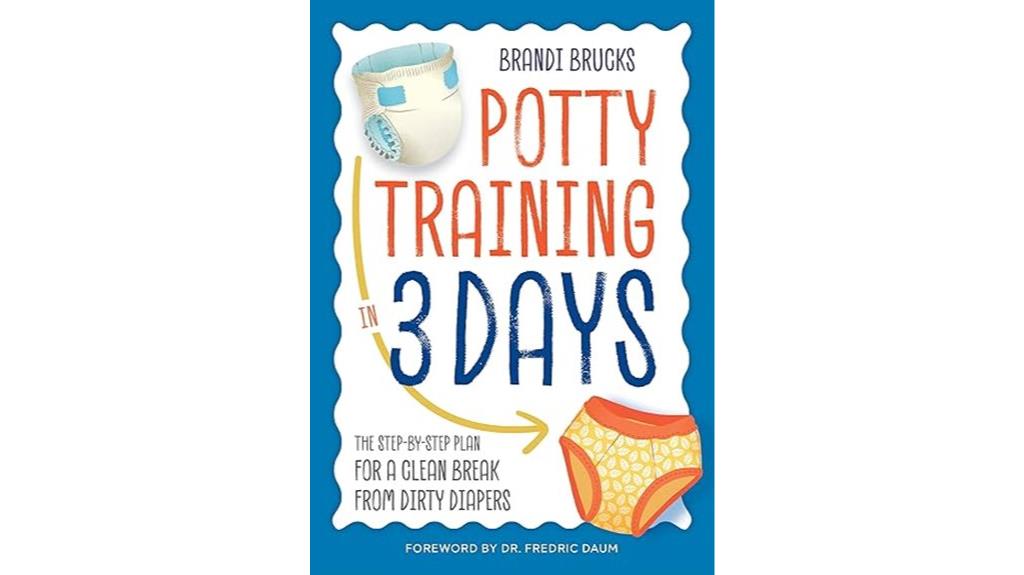
Many parents searching for a quick and effective way to shift their toddlers from diapers to the toilet find the “Potty Training in 3 Days” method an excellent choice. I’ve seen firsthand how this approach can work wonders. By focusing on my child’s readiness and being patient, I created an environment that made learning fun. I let my child go without pants on the first day, making accidents easier to monitor. Using a schedule for potty visits helped them recognize when to go. With encouragement and small rewards, my little one became accident-free in just a few days!
Best For: Parents looking for a quick and effective method to transition their toddlers from diapers to toilet training.
Pros:
- Effective Results: Many parents report their children becoming accident-free within just a few days.
- Structured Approach: The method includes a clear schedule for potty visits, helping children learn to recognize their needs.
- Positive Reinforcement: Encouragement and small rewards can motivate children during the learning process.
Cons:
- Child Readiness Required: The method may not work if the child is not developmentally ready, potentially leading to stress.
- Initial Accidents: Frequent accidents, especially on the first day, can be challenging and may require patience.
- Sugar Intake Concerns: Varying beverage choices could lead to excessive sugar consumption if not monitored.
The Gentle Sleep Book: Sleep Solutions for Parents of Newborns to Five-Year-Olds
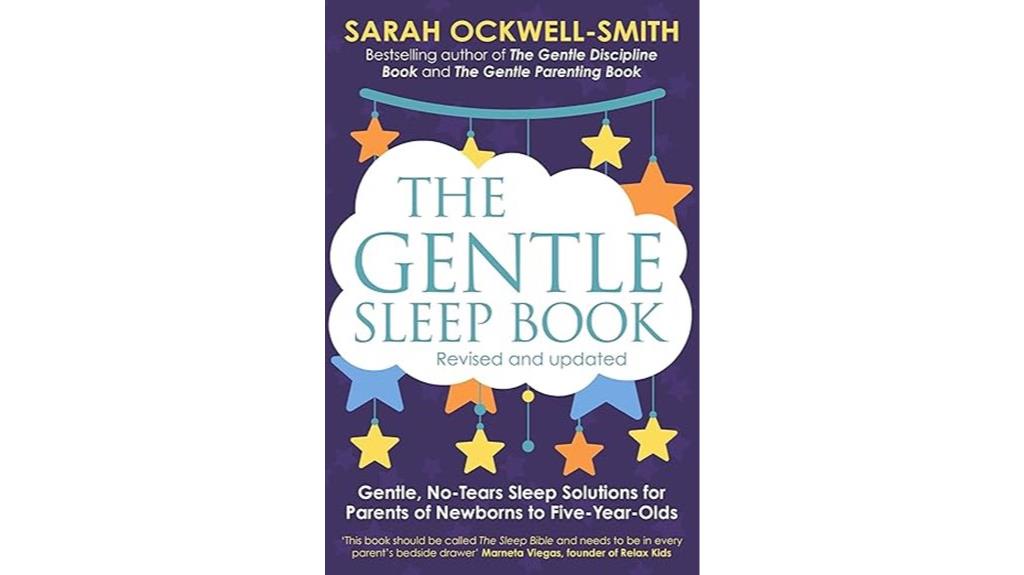
If you’re a first-time parent feeling overwhelmed by sleep challenges, “The Gentle Sleep Book” by Sarah Ockwell-Smith could be just what you need. This book is a lifesaver, offering realistic, science-backed advice that respects your child’s needs. I loved how it reassured me that sleep struggles are normal and temporary. Ockwell-Smith emphasizes nurturing attachment over harsh sleep-training methods, which made me feel empowered. While it leans towards traditional parenting norms, its core principles are adaptable to diverse lifestyles. This book helped me navigate my unique challenges, reminding me that meeting my child’s needs is a strength, not a flaw.
Best For: First-time parents seeking gentle and realistic sleep solutions that prioritize their child’s emotional needs and well-being.
Pros:
- Provides science-backed, gentle guidance that respects children’s needs and encourages nurturing attachment.
- Reassures parents that sleep difficulties are normal and temporary, alleviating guilt and anxiety.
- Offers adaptable principles that can be applied to various parenting styles and lifestyles.
Cons:
- May assume a traditional parenting approach, potentially overlooking diverse family dynamics and arrangements.
- Could be more inclusive of non-traditional work schedules and homeschooling situations.
- Some parents may find certain suggestions less applicable to their specific circumstances or beliefs about sleep training.
Moms on Call | Basic Baby Care 0-6 Months | Parenting Book 1 of 3
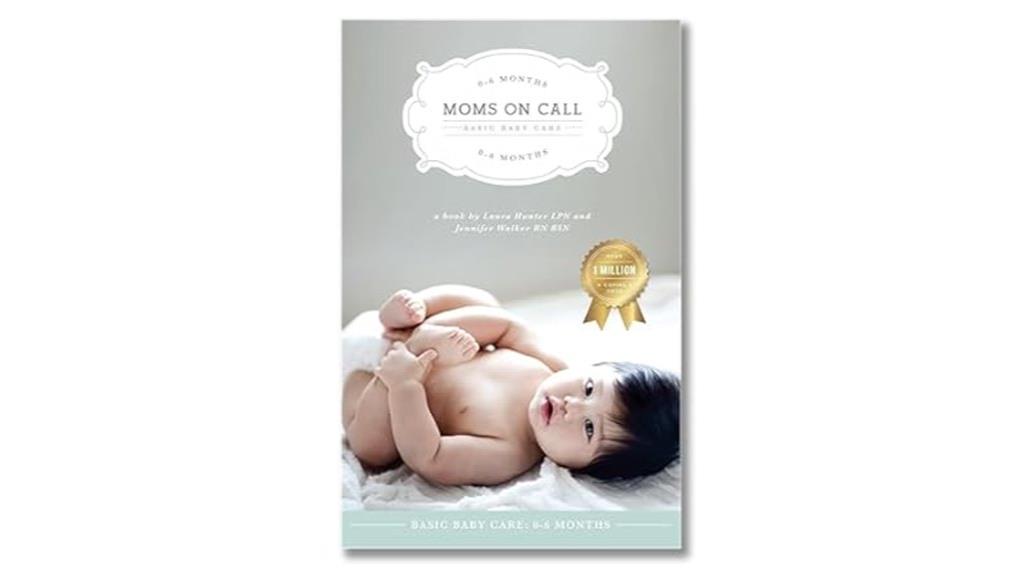
“Moms on Call” is an excellent choice for new parents seeking structured routines to navigate the early months of baby care. I found its practical advice incredibly helpful, especially when it came to sleep training. Starting around 14.5 weeks, I implemented their bedtime routine and noticed my baby began sleeping longer stretches, sometimes even through the night by five months. The book simplifies complex topics like solid food introduction and bathing, making it easy to follow. While it may not suit every parenting style, I appreciated the structure it provided amidst the chaos of new parenthood.
Best For: New parents looking for structured routines and practical advice to navigate the early stages of baby care.
Pros:
- Offers clear, actionable advice that simplifies parenting topics like sleep training and solid food introduction.
- Many parents report improved sleep patterns and overall family happiness after implementing the book’s methods.
- Provides a flexible approach, allowing parents to choose relevant sections without needing to read the entire book.
Cons:
- Some parents feel pressure to strictly adhere to the book’s recommendations, which may not suit all parenting styles.
- It may be more beneficial for those with supportive environments, such as stay-at-home parents or helpful family members.
- Readers may need to adapt the book’s guidelines to fit their individual family dynamics and values.
The New Parents Guide to Baby Sleep Training
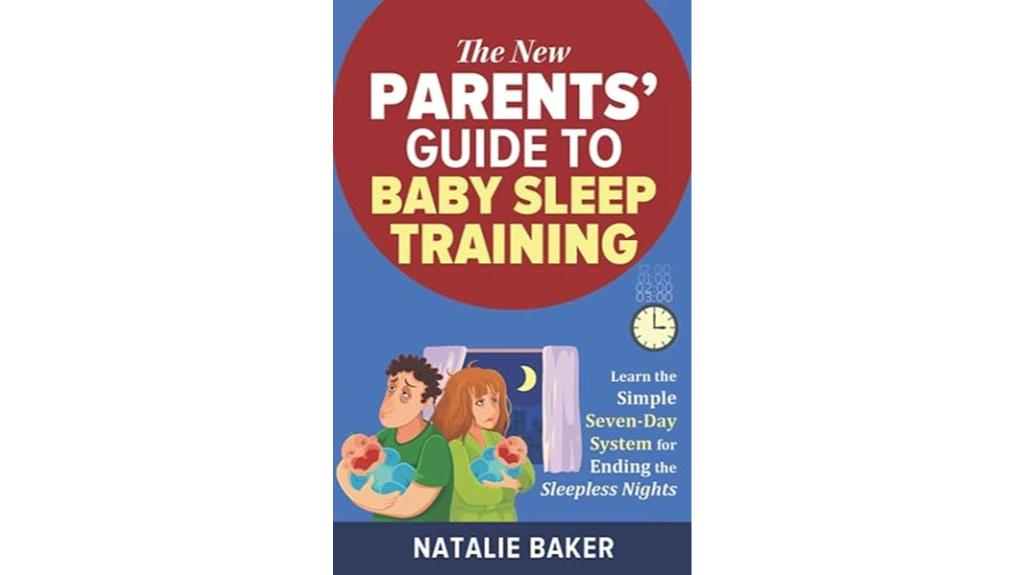
Struggling with sleepless nights and the challenge of understanding your baby’s cries? I found “The New Parents Guide to Baby Sleep Training” by Natalie Baker incredibly helpful. This book combines research with practical strategies, making it easy to establish healthy sleep routines. Baker emphasizes patience—both with your baby and yourself. I appreciated her clear explanations about different methods, from gradual extinction to creating a cozy sleep environment. Many parents have praised these techniques, noting their adaptability for various babies. Plus, the insights on separation anxiety were a bonus. If you’re managing sleep challenges, this guide is a must-read!
Best For: New parents seeking effective strategies for improving their baby’s sleep patterns and managing sleep challenges.
Pros:
- Combines research with practical strategies for establishing healthy sleep routines.
- Offers clear explanations of different sleep training methods, making it easy to adapt to individual situations.
- Provides valuable insights on related topics like separation anxiety, enhancing overall understanding of infant care.
Cons:
- Sleep training methods may not work for every baby, leading to varying success rates.
- Some parents may find the need for patience and consistency challenging during the process.
- The book may not cover all possible sleep-related issues, requiring additional resources for comprehensive guidance.
Sweet Dreams Ahead: Mastering Sleep Training for Your Baby
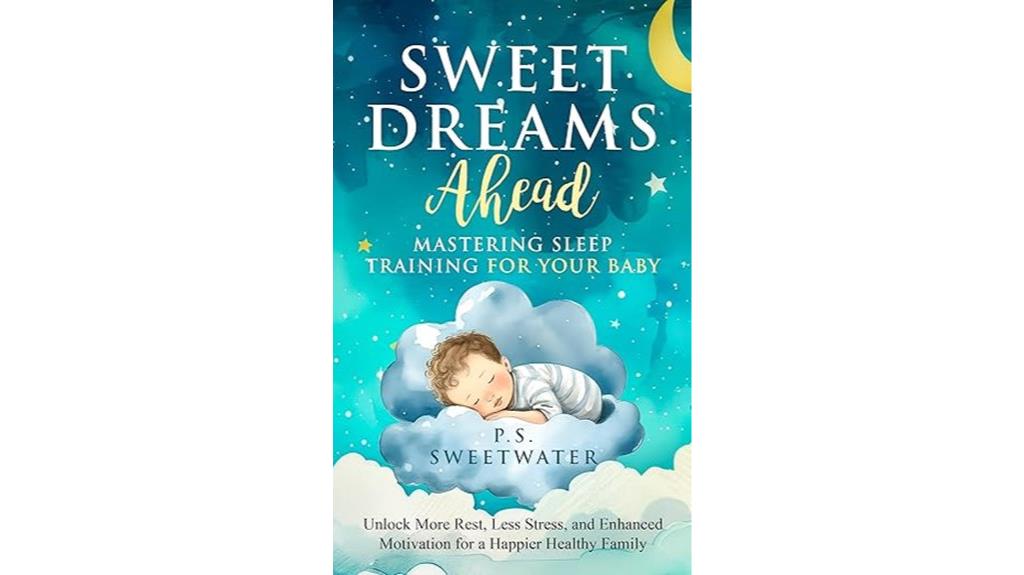
For new parents overwhelmed by sleepless nights, “Sweet Dreams Ahead: Mastering Sleep Training for Your Baby” offers a lifeline with its compassionate and practical approach to sleep training. I found its step-by-step techniques incredibly helpful in establishing calming bedtime routines. The book emphasizes consistency and gentle methods, making the process feel manageable. It not only teaches effective strategies but also boosts my confidence as a parent. After implementing its advice, I noticed improvements in my baby’s sleep within days. If you’re struggling, this book is a game changer, fostering a stronger bond between you and your little one through gentle training methods.
Best For: New parents seeking practical and compassionate guidance on sleep training for their babies.
Pros:
- Provides step-by-step techniques for establishing calming bedtime routines.
- Empowers parents with confidence and knowledge to handle sleep disruptions.
- Fosters a stronger bond between parent and child through gentle training methods.
Cons:
- Some parents may find the techniques require time and consistency to yield results.
- Individual baby temperaments may affect the effectiveness of the strategies.
- Not all methods may resonate with every parenting style, requiring adaptation.
The Newborn Sleep Book: A Simple Method for Training Your Baby to Sleep
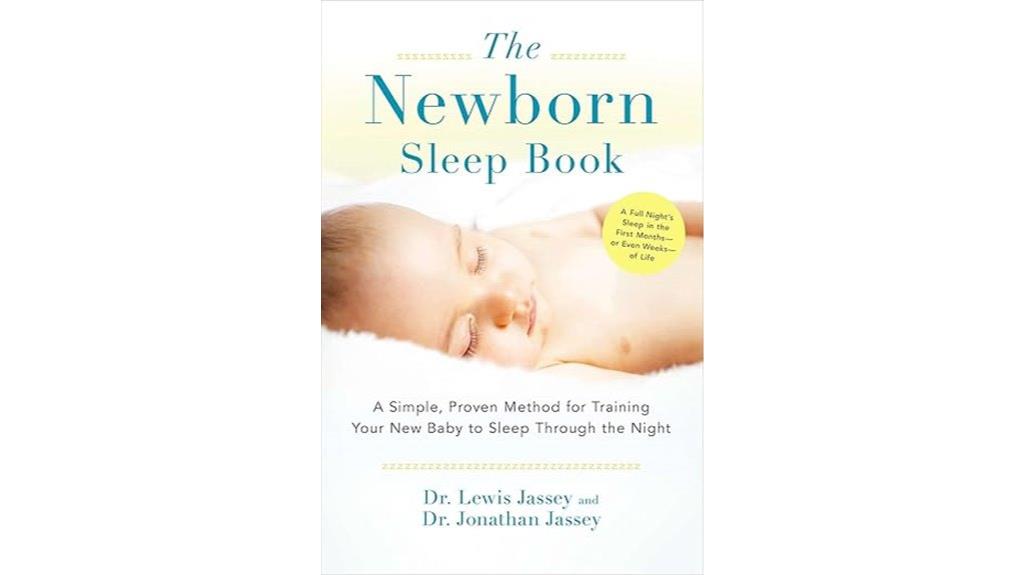
If you’re looking for a gentle yet effective method to help your baby sleep through the night, “The Newborn Sleep Book” might just be the perfect fit for you. This book introduces the Jassey Way, a compassionate approach that avoids cry-it-out techniques. It emphasizes feeding routines while allowing you to comfort your baby without immediately feeding. Many parents report their little ones sleeping through the night as early as six weeks, which is heartening. Rather than dismissing attachment parenting, this method offers an alternative that respects both sleep and bonding, making it a valuable resource for parents seeking restful nights.
Best For: Parents seeking a gentle and effective method to help their babies sleep through the night without using cry-it-out techniques.
Pros:
- Encourages a compassionate approach to sleep training, allowing for comfort without immediate feeding.
- Many parents report success with their babies sleeping through the night as early as six weeks.
- Provides an alternative to attachment parenting, promoting both sleep and bonding.
Cons:
- Some critics may misunderstand the method, believing it advocates for neglect or cry-it-out strategies.
- May not align with strict attachment parenting philosophies that emphasize responding to every cry.
- Initial adjustments to feeding routines may be challenging for some parents.
The Happiest Baby on the Block: Fully Revised and Updated Second Edition
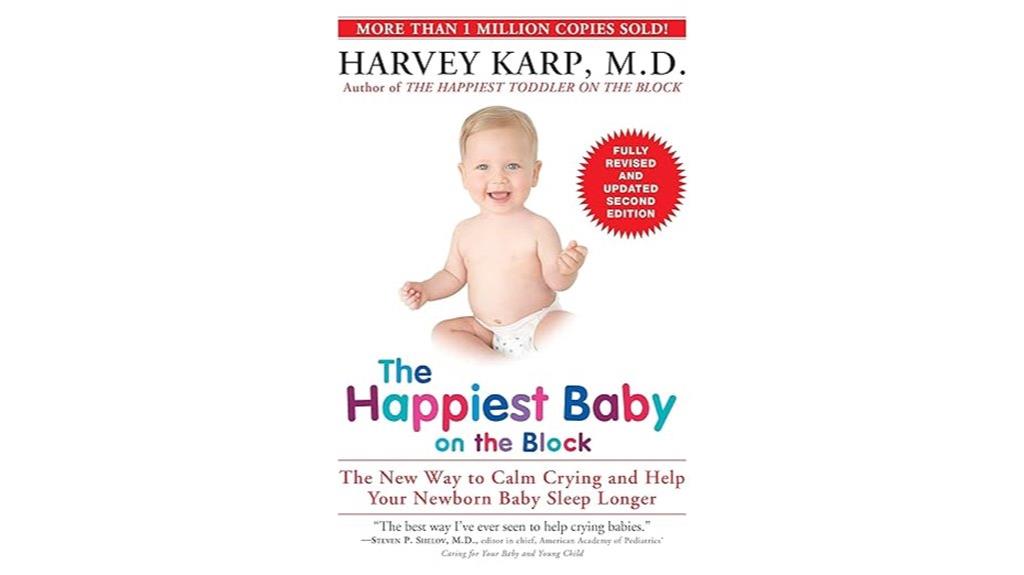
New parents searching for effective strategies to soothe their fussy babies will find “The Happiest Baby on the Block: Fully Revised and Updated Second Edition” an invaluable resource. This book introduces the 5 Ss—Swaddling, Side/Stomach position, Shushing, Swinging, and Sucking—powerful techniques that can calm a baby in moments. I appreciated its well-structured approach, balancing practical advice with reassuring insights. While some parts may feel repetitive, the guidance helped me navigate those overwhelming early days. Although it doesn’t explore deeply into sleep or feeding habits, I still highly recommend this book for any parent seeking relief and support during this challenging phase.
Best For: New parents seeking effective strategies to soothe fussy babies and navigate the challenges of early parenthood.
Pros:
- Provides the 5 Ss techniques that can calm babies quickly, improving sleep patterns.
- Well-structured, balancing practical advice with reassuring insights for overwhelmed parents.
- Offers a comprehensive approach to managing fussy babies, empowering parents with easy-to-follow guidance.
Cons:
- Contains repetitive content that some readers may find unnecessary.
- Lacks detailed discussions on critical aspects like sleep and feeding habits.
- Could benefit from a more rounded perspective on factors contributing to a happy baby.
Become Your Childs Sleep Coach
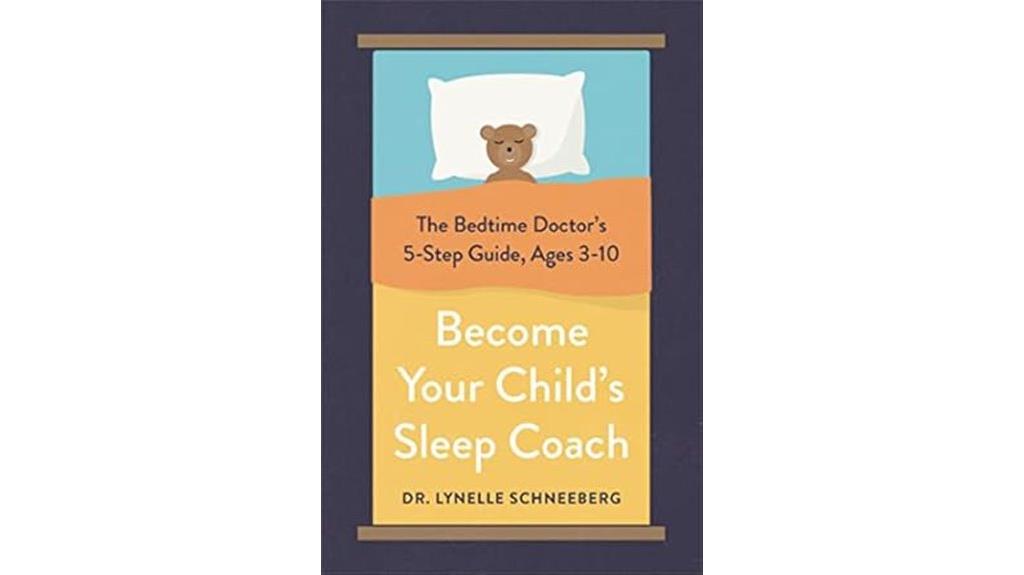
Parents struggling with their child’s sleep routines will find “Become Your Child’s Sleep Coach” by Dr. Schneeberg a game-changer. This practical guide offers clear steps that I found easy to implement, leading to noticeable improvements in my child’s sleep within days. The “5 B’s” approach and Bedtime Basket concept helped my little one entertain themselves until drowsy, fostering independence at bedtime. I noticed a positive shift in our family dynamics too; peaceful evenings became our norm. Dr. Schneeberg’s expertise and relatable anecdotes made me feel supported, and I truly wish I’d discovered this book sooner. It’s a must-read for every parent!
Best For: Parents seeking effective strategies to improve their children’s sleep routines and foster independent sleeping habits.
Pros:
- Provides clear and practical techniques that are easy to implement.
- Encourages independence in children, reducing parent involvement at bedtime.
- Positively impacts family dynamics by creating a calmer home environment.
Cons:
- Some parents may find it challenging to implement changes consistently.
- Results may vary depending on the child’s individual sleep issues.
- The book may not address all specific sleep challenges faced by every child.
Factors to Consider When Choosing Sleep Training Books for Parents

When I look for sleep training books, I always consider how well they align with my parenting philosophy. I also think about whether the techniques are suitable for my child’s age and if the author has the right credentials. It’s crucial for me to choose approaches that are flexible and backed by evidence to guarantee I’m making the best choices for my family.
Parenting Philosophy Alignment
Choosing a sleep training book that aligns with your parenting philosophy is essential, as it can profoundly influence your approach and outcomes. Understanding your beliefs is significant because methods can vary widely, from strict techniques to gentle, attachment-focused approaches. If you believe in co-sleeping or attachment parenting, look for books that validate those choices. On the other hand, if you seek consistency and control, structured routines might resonate more with you. It’s important to reflect on how different techniques might affect your child’s emotional well-being, and choose resources that respect your instincts. Ultimately, picking a method that feels comfortable and aligns with your values can lead to better outcomes for both you and your child.
Age-Appropriate Techniques
Understanding your parenting philosophy naturally leads to contemplating age-appropriate techniques for sleep training. When I choose a sleep training book, I always consider my child’s age. Infants, toddlers, and preschoolers have different developmental sleep needs. Some books suggest starting sleep training as early as 4 months, while others recommend waiting until around 6 months when babies show readiness signs. For newborns, gentle routines and calming environments are key, while older infants might need structured methods that encourage self-soothing. With toddlers and preschoolers, I look for strategies that tackle bedtime resistance and night wakings, emphasizing consistency. Age-specific timelines in these books help guarantee I introduce techniques when my child is developmentally ready, making a significant difference in our sleep journey.
Flexibility and Adaptability
While I appreciate structured sleep training methods, I know flexibility is essential for success. Each family is unique, and adapting sleep strategies to fit our specific circumstances makes all the difference. I’ve found that tweaking routines—like adjusting feeding schedules or nap durations—can align better with my baby’s temperament and developmental stage. A flexible approach alleviates the stress of rigid adherence to one method, creating a relaxed environment that promotes effective sleep training. Books emphasizing adaptability usually offer a variety of techniques, making it easier for me to choose what feels right. Understanding that not all babies respond the same way encourages patience, allowing me to explore various approaches until I find what truly works for my child.
Author’s Credentials and Experience
When evaluating sleep training books, I find it essential to ponder the author’s credentials and experience. An author who’s a board-certified pediatrician or psychologist brings credibility, ensuring the advice is rooted in professional expertise. Personal parenting experiences also matter; they can make the guidance more relatable and applicable to real-life challenges. Authors with a background in sleep medicine often provide scientifically-backed strategies that address children’s sleep issues thoroughly. Additionally, books endorsed by pediatricians or child development experts carry extra weight, validating their methods. Finally, authors with research in child psychology can offer valuable insights into the emotional and developmental aspects of sleep training, enhancing the overall effectiveness of their recommendations.
Evidence-Based Approaches
How can you guarantee the sleep training book you choose is backed by solid evidence? Look for books that incorporate research findings and clinical expertise, ensuring the techniques are scientifically validated. Effective strategies often emphasize self-soothing skills, helping infants learn to fall asleep independently and reduce night wakings. I’ve found that books offering a variety of methods—both gentle and structured—allow me to choose approaches that fit my child’s temperament and my family’s values. This adaptability enhances our chances of success. Also, consider how the book addresses developmental stages of sleep since infants’ patterns change considerably in their first year. Testimonials from other parents can further validate the real-world applicability of the strategies presented.
Supportive Community Resources
Finding the right sleep training book isn’t just about the content; it’s also about the community resources that come with it. I’ve discovered that many books offer access to supportive online communities, like Facebook groups, where parents can connect. These platforms have become invaluable for sharing experiences, troubleshooting issues, and celebrating successes. Honestly, engaging with other parents helps ease feelings of isolation and anxiety, creating a sense of camaraderie during this challenging journey. Plus, the encouragement I receive from fellow parents keeps me accountable and committed to the methods I’m trying. Some books even provide links to additional resources or workshops, fostering continuous learning and adaptation, which I find incredibly helpful in my sleep training efforts.
Frequently Asked Questions
How Do I Choose the Right Sleep Training Book for My Baby?
When I chose a sleep training book for my baby, I focused on my parenting style and my baby’s needs. I looked for books that offered practical techniques and relatable experiences. Reading reviews helped me gauge other parents’ successes. I also considered the author’s credentials to guarantee their advice was trustworthy. Ultimately, I picked a book that resonated with me and felt right for my family’s unique situation. Trust your instincts!
What Age Is Best to Start Sleep Training?
They say, “The early bird catches the worm.” I believe the best age to start sleep training is around four to six months. At this stage, babies typically develop more predictable sleep patterns and can self-soothe better. I found that beginning too early can be challenging since newborns have different needs. Trust your instincts, but remember, every baby is unique. If you feel ready, it might just be the right time for your child.
Are Sleep Training Methods Safe for All Babies?
I believe sleep training methods can be safe for most babies, but it really depends on their individual needs and temperament. I’ve always listened to my instincts and consulted my pediatrician before starting any training. Some methods might not suit every baby, especially those with medical conditions or developmental concerns. It’s important to be flexible and adjust your approach, ensuring your little one feels secure and supported throughout the process.
Can Sleep Training Help With Night Terrors or Sleepwalking?
They say, “A good night’s sleep is the best medicine.” I’ve found that sleep training can be helpful for some children experiencing night terrors or sleepwalking, but it’s not a guaranteed fix. Each child’s sleep patterns are unique. I recommend observing your child’s behavior and consulting a pediatrician. They can provide tailored advice, ensuring you choose the best approach for your little one’s sleep challenges. Patience and understanding go a long way!
How Do I Handle Setbacks During Sleep Training?
Handling setbacks during sleep training can be tough, but I’ve learned to stay patient and consistent. When my child struggles, I remind myself that progress isn’t always linear. I adjust our routine as needed, focusing on what worked before. It’s essential to celebrate small victories and not get discouraged by a few rough nights. I keep my approach gentle, knowing that persistence and love will eventually lead us back to success.
Conclusion
In my journey as a parent, I’ve learned that “a well-rested child is a happy child.” Choosing the right sleep training book can make all the difference in achieving those restful nights. Whether you’re drawn to structured methods or more flexible approaches, these expert-recommended resources can guide you through the challenges of sleep training. Remember, every child is unique, so don’t hesitate to explore different strategies until you find what works best for your family. Sweet dreams await!
